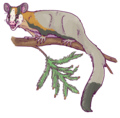Henkelotherium
| Henkelotherium guimarotae Temporal range: Late Jurassic,
| |
|---|---|

| |
| Skeleton | |
| Scientific classification | |
| Kingdom: | |
| Phylum: | |
| Class: | |
| Subclass: | |
| Order: | |
| Family: | |
| Genus: | Henkelotherium Krebs, 1991
|
| Species | |
| |
Henkelotherium is an extinct genus of mammal from the Late Jurassic (Kimmeridgian) Camadas de Guimarota, in Portugal.[1] It differs from most other paurodontids in having more postcanine teeth.
| Mammaliaformes |
| ||||||||||||||||||||||||||||||||||||||||||||||||||||||||||||||||||||||||||||||||||||||||||||||||||||||
Paleobiology
Primitive characters of Henkelotherium (e.g. asymmetric condyles of the femur) indicate that this species had a mode of locomotion similar to tree shrews and opossums. The small size of Henkelotherium and elongated tail made it suited to an arboreal lifestyle and capable of climbing trees, a notion supported by the paleoecological reconstruction of the Guimarota ecosystem indicating a densely vegetated environment.[2]
See also
References
- ^ Krebs B., 1991. Das Skelett von Henkelotherium guimarotae gen. et sp. nov. (Eupantotheria, Mammalia) aus dem Oberen Jura von Portugal. Berl Geowiss Abh A.: 133:1–110.
- ^ Vázquez-Molinero, R., Martin, T., Fischer, M. S. and Frey, R. (2001), Comparative anatomical investigations of the postcranial skeleton of Henkelotherium guimarotae Krebs, 1991 (Eupantotheria, Mammalia) and their implications for its locomotion. Zool. Reihe, 77: 207–216. doi: 10.1002/mmnz.20010770206
Further reading
- Ramón Vázquez Molinero: Comparative anatomy of Henkelotherium guimarotae (Holotheria), a late Jurassic small mammal, and its relevance for the evolution of the mode of locomotion of modern mammals. Dissertation. Freie Universität Berlin, Fachbereich Geowissenschaften, 2003. Dissertation Online
http://www.diss.fu-berlin.de/diss/receive/FUDISS_thesis_000000001206





